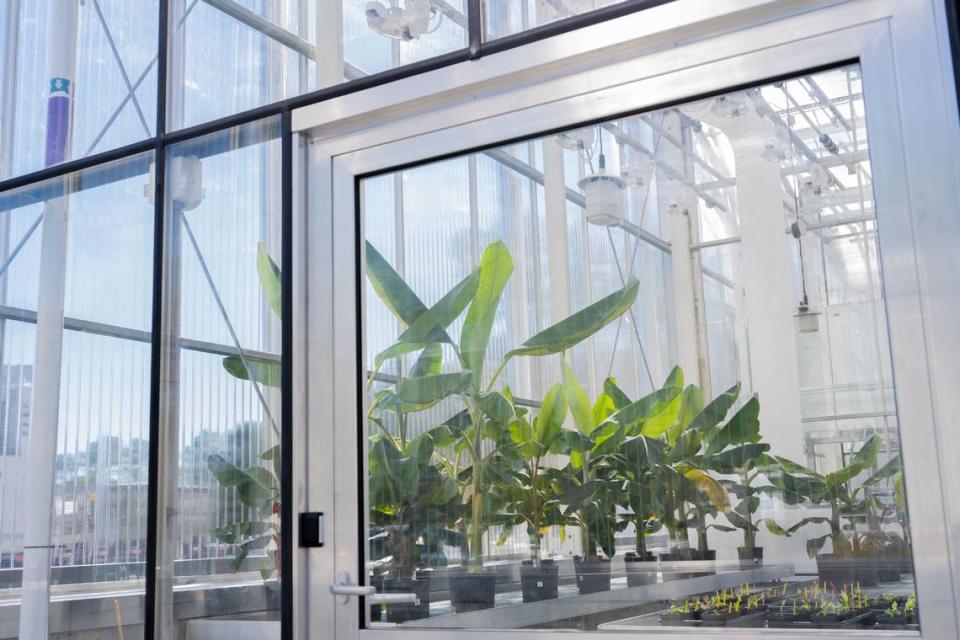Durham agtech startup strives to save the banana from potential extinction
It’s happened before. In the 1950s, the world’s most common commercial banana — the kind found inside most U.S. grocery stores — was a variety called Gros Michel. But then the spread of a fungus named Fusarium began to wipe it out, so growers shifted to a new variety, the Cavendish, which proved resistant to the illness the fungus caused.
Tasty, transportable and growable year-round, Cavendish bananas dominate the global market today. It is now a grocery mainstay, accounting for roughly 99% of global banana exports. Yet this concentration also makes the industry susceptible to an old foe.
A new strain of Fusarium is spreading, and some fear it could cause the Cavendish to go extinct. Fusarium lives in the soil and enters plants through their roots, rotting crops from the inside by constraining their water and nutrients. The condition is known as Fusarium wilt or Panama disease. It is moving faster, researchers have found, across Asia, South America and Africa.
Once the fungus colonizes an area, it can ruin whole swatches of once-fertile land.
The World Banana Forum, a division overseen by the United Nations, has created a task force to address Fusarium wilt. Governments from Taiwan to Belize have gotten involved, too. And in 2021, two of the largest fresh banana producers, Dole and Chiquita, entered a global alliance to help halt the threat.
Joining these international efforts to save the Cavendish is a Research Triangle biotech startup.
“If you think about one food that you could imagine in every country, in every culture of the world, there are not very many that make that list, but sweet bananas are one of them,” said Todd Rands, president and CEO of Elo Life Systems. “And so, it’s such an important part of the staple diets around the world.”
Molecular scissors
Elo launched in late 2021 as a spinoff from the Durham-based Precision BioSciences. The new company now has 37 employees and operates offices, wet labs and a greenhouse on the Alexandria Center for Life Sciences campus in Research Triangle Park. In January, it celebrated adding $20.5 million to its Series A funding round.
Part of Elo focuses not on bananas, but on producing monk fruit sweetener through gene modification. Its scientists replicate the DNA of the round and rare monk fruit, then insert it into more abundant fruits and vegetables — like watermelons and tomatoes. These surrogate crops then yield no-calorie monk fruit extract, which Elo coined “the holy grail” of sweeteners.
In 2020, the startup partnered with Dole to develop a Fusarium-resistant banana. Elo began by examining non-Cavendish varieties to pinpoint what genetically enabled them to fend off the fungus.
“With that knowledge, we can go back to the crops that we need in our food supply, and think about the edits that we can make that enable those crops to be resistant to the disease,” Rands said.

Using what he called “molecular scissors,” Elo scientists modified the genetics of the Cavendish and tested the new plants to ensure they could ward off high levels of Fusarium.
“Then we ship those down to Central and South America for evaluation,” Rands said.
Putting the bananas to the test
In its annual financial report last March, Dole said Fusarium spread had yet to cause “any material impacts to our growing or sourcing operations.”
But the Ireland-based company added it was developing “contingency plans” should the fungus advance. They included the potential use of “conventionally-bred, gene-edited or genetically modified,” banana plants.
In April, Dole planted several Elo-engineered Cavendish plants in an infected field in Columbia, Bloomberg reported.
But creating Fusarium-resistant bananas is only part of the solution. Being able to grow the plants at scale is imperative. Bananas are the world’s most eaten fruit, comprising a $25 billion global industry.
In its annual report, Dole noted another banana variety used in Asia and Australia effectively tolerates Fusarium but produces yields around 15-20% lower than Cavendish.
“The global scale of what bananas do is a different kind of challenge,” Rands said. “These are hard problems. If they were easy, we would have taken care of it years ago. And that’s exactly what Elo is looking for.”

